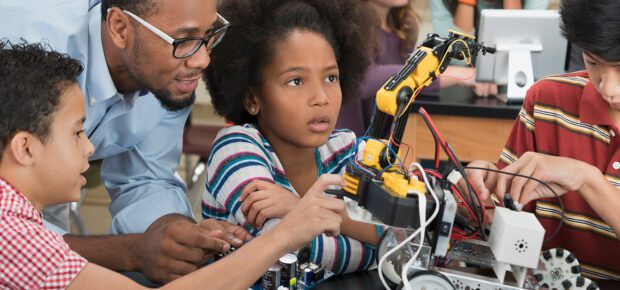July 28, 2021
Mentors are uniquely positioned to help increase diversity, equity and inclusion (DEI) in STEM by serving as role models for individuals that look and identify like them, encouraging a more welcoming environment for continued growth for marginalized communities. More broadly, mentors show younger students that it’s possible to follow their dreams and be successful – regardless of gender, ethnic background, cultural background, socioeconomic status, etc.
To better understand the importance of diverse mentorship in education equity, we spoke with four IEEE members making a difference in STEM.
The Importance of DEI in Mentorship and Personal Connections
Jing Dong, IEEE Senior Member
People are like leaves – there are no two in the world that are identical. Everyone is unique, and so we cannot consider education to be a single, one-size-fits-all-model. Hence, diversity, equity and inclusion are very important factors within the context of mentorship, as they serve to provide multiple perspectives for students, inspiring them to better apply themselves and be creative.
Ultimately, mentors have the capacity to have a tremendous influence on young people in particular; the relationship between mentor and mentee has always reminded me of the parent-child dynamic, which is why it’s so critical for students to identify their role models earlier on.
Keeley Crockett, IEEE Member
In 2001, I attended the IEEE conference on Fuzzy Systems FUZZ-IEEE in Melbourne, where I was fortunate to meet Professor Bernadette Bouchon-Meunier from the Université Pierre et Marie Curie, who had started the group within the IEEE Computational Intelligence Society, also known as the IEEE Women in Computational Intelligence.
Several years later, at FUZZ-IEEE 2006, I attended a networking lunch and was on a panel and unofficially adopted Bernadette as my mentor.
Bernadette is still my mentor; she is always there for me when I’m seeking advice. She has helped me tremendously with respect to my career development and I consider myself extremely lucky to have connected with her so many years ago.
Paths Towards Diversity in STEM
Jelena Kovačević, IEEE Fellow
Mentorship has always been an important part of the academic process.
If we are working towards creating a more diverse and inclusive academic environment that better represents the communities we live in, then we need to encourage, and make a point of, creating more DEI-focused mentorship opportunities. To increase the number of students from underrepresented communities in STEM, we need to have not only a larger number of people that the students will identify with, but also provide support to both mentors and mentees.
I had a number of people in my life who helped me. I consider myself very lucky. The best mentors are those who are supportive but also honest; I may not have always liked their suggestions, but because I knew they had my best interests at heart. I always took them seriously, even if I didn’t always follow them.
Tereza Cristina Melo de Brito Carvalho, IEEE Member
In Brazil, I coordinate a program called Paideia, which aims to train low-income students aged 15-17 in digital technologies to enable them to increase their employability. This program is organized in three tracks: digital technologies and computer programming; sustainable development and management.
Many students in this program find themselves frustrated, as math and logic programming, two core components of the curriculum, are very challenging. When this occurs, my colleagues and I introduce mentors to struggling students. We’ve found that the struggling students are much more receptive to their mentors than teachers.
Diversity of Thought for Better Innovation
Keeley Crockett, IEEE Member
In artificial intelligence product and service conceptualization and design, having a diverse team can foster more holistic product development, enabling us to better tackle problems, such as data quality, representativeness and potential bias – in many forms – when building machine learning models.
For a student, being mentored by a role model that looks and identifies like them enables valuable experiences to be shared, particularly within the context of navigating challenges. Mentors can empower mentees to devise their own strategies to better place them in positions of control, enabling them to contribute to industry and society in ways that otherwise might not have been possible.
I mentored a young woman who was studying for her degree with great aspirations. She became pregnant just before her final year. She came back after six months and completed her studies. We carried on our mentoring relationship all the way through her studies and beyond.
Sometimes mentoring is about listening, empathizing and providing support beyond what typically occurs within a formal mentor-mentee relationship. Being a great mentor is about being at the other end of a phone call when someone needs you and being able to get them the specific help and support they need.
Six years later, she is now also a qualified teacher, has a beautiful son, and has gotten married. We are lifelong mentee-mentors.


 Meaningful Momentum or Running in Place?
Meaningful Momentum or Running in Place? AI Through Our Ages
AI Through Our Ages Liquid Infrastructure: Our Planet's Most Precious Resource
Liquid Infrastructure: Our Planet's Most Precious Resource The Impact of Technology in 2025
The Impact of Technology in 2025 Quantum and AI: Safeguards or Threats to Cybersecurity?
Quantum and AI: Safeguards or Threats to Cybersecurity? Why AI Can't Live Without Us
Why AI Can't Live Without Us Bits, Bytes, Buildings and Bridges: Digital-Driven Infrastructure
Bits, Bytes, Buildings and Bridges: Digital-Driven Infrastructure Impact of Technology in 2024
Impact of Technology in 2024 Emerging AI Cybersecurity Challenges and Solutions
Emerging AI Cybersecurity Challenges and Solutions The Skies are Unlimited
The Skies are Unlimited Smart Cities 2030: How Tech is Reshaping Urbanscapes
Smart Cities 2030: How Tech is Reshaping Urbanscapes Impact of Technology 2023
Impact of Technology 2023 Cybersecurity for Life-Changing Innovations
Cybersecurity for Life-Changing Innovations Smarter Wearables Healthier Life
Smarter Wearables Healthier Life Infrastructure In Motion
Infrastructure In Motion The Impact of Tech in 2022 and Beyond
The Impact of Tech in 2022 and Beyond Cybersecurity, Technology and Protecting Our World
Cybersecurity, Technology and Protecting Our World How Technology Helps us Understand Our Health and Wellness
How Technology Helps us Understand Our Health and Wellness The Resilience of Humanity
The Resilience of Humanity Harnessing and Sustaining our Natural Resources
Harnessing and Sustaining our Natural Resources Creating Healthy Spaces Through Technology
Creating Healthy Spaces Through Technology Exceptional Infrastructure Challenges, Technology and Humanity
Exceptional Infrastructure Challenges, Technology and Humanity The Global Impact of IEEE's 802 Standards
The Global Impact of IEEE's 802 Standards Scenes of our Cyber Lives: The Security Threats and Technology Solutions Protecting Us
Scenes of our Cyber Lives: The Security Threats and Technology Solutions Protecting Us How Millennial Parents are Embracing Health and Wellness Technologies for Their Generation Alpha Kids
How Millennial Parents are Embracing Health and Wellness Technologies for Their Generation Alpha Kids Space Exploration, Technology and Our Lives
Space Exploration, Technology and Our Lives Global Innovation and the Environment
Global Innovation and the Environment How Technology, Privacy and Security are Changing Each Other (And Us)
How Technology, Privacy and Security are Changing Each Other (And Us) Find us in booth 31506, LVCC South Hall 3 and experience the Technology Moon Walk
Find us in booth 31506, LVCC South Hall 3 and experience the Technology Moon Walk Virtual and Mixed Reality
Virtual and Mixed Reality How Robots are Improving our Health
How Robots are Improving our Health IEEE Experts and the Robots They are Teaching
IEEE Experts and the Robots They are Teaching See how millennial parents around the world see AI impacting the lives of their tech-infused offspring
See how millennial parents around the world see AI impacting the lives of their tech-infused offspring Take the journey from farm to table and learn how IoT will help us reach the rising demand for food production
Take the journey from farm to table and learn how IoT will help us reach the rising demand for food production Watch technical experts discuss the latest cyber threats
Watch technical experts discuss the latest cyber threats Explore how researchers, teachers, explorers, healthcare and medical professionals use immersive technologies
Explore how researchers, teachers, explorers, healthcare and medical professionals use immersive technologies Follow the timeline to see how Generation AI will be impacted by technology
Follow the timeline to see how Generation AI will be impacted by technology Learn how your IoT data can be used by experiencing a day in a connected life
Learn how your IoT data can be used by experiencing a day in a connected life Listen to technical experts discuss the biggest security threats today
Listen to technical experts discuss the biggest security threats today See how tech has influenced and evolved with the Games
See how tech has influenced and evolved with the Games Enter our virtual home to explore the IoT (Internet of Things) technologies
Enter our virtual home to explore the IoT (Internet of Things) technologies Explore an interactive map showcasing exciting innovations in robotics
Explore an interactive map showcasing exciting innovations in robotics Interactively explore A.I. in recent Hollywood movies
Interactively explore A.I. in recent Hollywood movies Get immersed in technologies that will improve patients' lives
Get immersed in technologies that will improve patients' lives